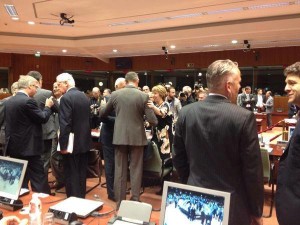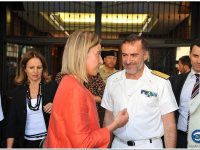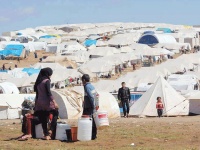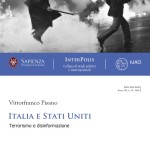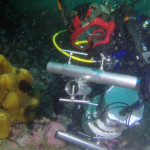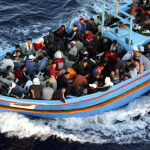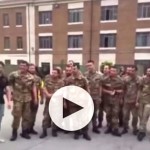The Foreign Affairs Council meeting adopted the following conclusions on Iraq:
“1. The EU reiterates its firm commitment to Iraq’s unity, sovereignty and territorial integrity. It expresses its deep concern at the severe deterioration of the security and humanitarian situation in the country. Iraq is an important partner in need of strong support under the current challenging circumstances.
2. The EU is extremely concerned at the dire humanitarian situation and the massive displacements of civilians, mainly in the Northern regions as a result of the assaults by ISIL and other associated armed groups. The Ministers recalled the substantial efforts of solidarity that the EU and its Member States are making to provide humanitarian aid and welcomed the commitment of additional European funds as well as the mobilization of the European Emergency Response Coordination Centre and the activation of the European Union Civil Protection Mechanism at the request of the Iraqi government, to deliver assistance in kind including through the establishment of a humanitarian air bridge to northern Iraq adapted to the needs in the field. The EU underlines the need to take urgent action to facilitate, in accordance with international humanitarian law, access to populations in need and welcomes the efforts made by the US and other partners.
3. The EU remains seriously concerned about the deterioration of the security situation in Iraq and condemns in the strongest terms the attacks perpetrated by ISIL and other associated armed groups. The EU also condemns the atrocities and abuses of basic human rights, in particular when committed against targeted religious minorities and most vulnerable groups. Some of these acts, committed in Iraq and Syria, may constitute crimes against humanity and must be investigated swiftly so that the perpetrators are held accountable. The EU welcomes the US efforts to support the Iraqi national and local authorities in their fight against ISIL and recognises international and European responsibility to cooperate with Iraq in our common fight against terrorism.
The Council also welcomes the decision by individual Member States to respond positively to the call by the Kurdish regional authorities to provide urgently military material. Such responses will be done according to the capabilities and national laws of the Member States, and with the consent of the Iraqi national authorities. The EU will assess how to prevent ISIL benefitting from oil sales and condemns those funding the ISIL in contravention of UNSCR 1267 and subsequent resolutions. The Ministers invite the European External Action Service to ensure a stronger presence in Erbil.
4. The EU welcomes the nomination of Mr. Heider Al Abadi as Prime Minister-designate and expresses its continued support for the constitutional process. The EU is confident that the Prime Minister-designate will proceed with the formation of a new government as a matter of urgency and insists on the importance for it to be inclusive and able to address the needs and legitimate aspirations of all the Iraqi citizens. It calls on all political, religious and tribal leaders to contribute to this crucial effort to reinforce the credibility of the future government, giving, in particular to Sunni and Kurdish populations through a process of mutual engagement, new confidence in the democratic institutions and paving the way to a political solution of the current crisis.
5. The EU expresses its strong support for the United Nations Assistance Mission in Iraq (UNAMI) and calls on Iraq’s neighbouring countries and other partners to enhance cooperation and develop concrete actions to facilitate the long-term solution of the current crisis and fight against the common terrorist threat and for the preservation of a united and democratic Iraq”.
The Council adopted the following conclusions on Libya:
“The EU reiterates its condemnation of the increasing violence in Tripoli, Benghazi and elsewhere in the country and its devastating effect on the lives of the civilian population and is strongly concerned by the threats it represents for regional security and for the European Union. It recalls also EU support to the Libyan people in its transition. The EU calls on all parties involved in the hostilities to immediately cease all violence and to end the suffering of the civilian population, notably by engaging in a peaceful dialogue. The EU strongly supports the on-going efforts of the United Nations Support Mission in Libya (UNSMIL) to achieve an immediate ceasefire and to end the bloodshed and welcomes its partial return to Tripoli facilitated by Italy. The EU urges all sides to respond positively and without delay. The Ministers also acknowledged the concerted effort of the neighbouring countries in helping Libya overcome the crisis as well as their solidarity in dealing with displaced persons coming out of Libya.
The EU encourages the elected House of Representatives to playing its rightful role in leading efforts aimed at creating the dynamics for an inclusive political settlement embracing all political actors. The EU encourages the members of the House of Representatives to carry out their tasks in a spirit of inclusiveness, moderation and in the interest of the country, and calls upon all parties to support it. The EU commends the efforts of the UN Special Representative of the UN Secretary-General for Libya, Mr Tarek Mitri and welcomes the nomination of the EU Special Envoy for Libya Mr Bernardino León as his successor. The EU has consistently supported the central role of the UN in coordinating international efforts in Libya. The EU sees the appointment of Mr León as an acknowledgement of the EU’s engagement and recalls, in this regard, its efforts for a successful Libyan transition including through different support programmes to the Libyan people for security, economic recovery, health and protection of vulnerable groups amongst others. The EU underlines again the role of EUBAM Libya in assisting Libya with its border management challenges”.
The Council adopted the following conclusions on the Middle East (Gaza):
“1. The EU is extremely concerned about the fragile situation on the ground following the recent conflict in the Gaza Strip. It strongly welcomes the ceasefire which has been in place since 11 August and calls on all the parties concerned to agree on and abide by a durable ceasefire. The EU commends the considerable efforts and commitment of Egypt to broker this and earlier deals.
2. The EU remains concerned about the disastrous humanitarian situation in the Gaza Strip particularly the conditions of the displaced population, water supplies, electricity services, unexploded ordnance as well as destroyed and uninhabitable homes. The EU calls for increased efforts to facilitate, in accordance with international humanitarian law, immediate and unimpeded humanitarian access into the Gaza Strip including for humanitarian personnel and supplies, and for the mobilisation of humanitarian aid for the population of Gaza.
3. The situation in the Gaza Strip has been unsustainable for many years and a return to the status quo prior to the latest conflict is not an option. A durable ceasefire must lead to a fundamental improvement in the living conditions for the Palestinian people in the Gaza Strip through the lifting of the Gaza closure regime, and it must end the threat to Israel posed by Hamas and other militant groups in Gaza as demonstrated by rocket attacks and tunnel construction. All terrorist groups in Gaza must disarm.
4. In this context and subject to the requests of our partners based on the outcome of the Cairo talks, the EU reiterates its readiness to contribute to a comprehensive and sustainable solution enhancing the security, welfare and prosperity of Palestinians and Israelis alike. The EU will develop options for effective and comprehensive action in the following areas: movement and access, capacity building, verification and monitoring, humanitarian relief and post-conflict reconstruction and rehabilitation through international donor efforts including the eventual organisation of a donors’ conference. The EU is ready to support a possible international mechanism endorsed by the UNSC, including through the reactivation and possible extension in scope and mandate of its EUBAM Rafah and EUPOL COPPS missions on the ground, including the launch of a training programme for Palestinian Authority customs personnel and police for redeployment in Gaza.
5. In line with UNSCR 1860, the EU is prepared to contribute to arrangements that prevent illicit trafficking in arms and ammunition to the Gaza Strip and which can ensure the sustained re-opening of Gaza’s crossing points. The EU will also study options for an internationally-supervised mechanism to enable full access and movement through all Gaza ports of entry.
6. The EU recalls that the situation in the Gaza Strip has to be seen within the broader context of the Middle East Peace Process and the prospect of comprehensive peace where two democratic states, Israel and Palestine, live side by side in peace with secure and recognised borders. This remains our ultimate objective. The Gaza Strip constitutes an integral part of the territory occupied in 1967 and will be part of a future State of Palestine. The situation in the Gaza Strip cannot and must not be seen separately from the broader challenges and developments on the ground that continue to make the prospect of the two-state solution increasingly difficult to attain.
7. The EU has demonstrated its commitment to working with the government of Prime Minister Netanyahu and with the Palestinian consensus government comprised of independent personalities under the leadership and expressed commitments of President Abbas, which must exercise its full government responsibilities in both the West Bank and the Gaza Strip including in the field of security, civil administration and through its presence at Gaza’s crossing points. The EU reiterates that commitment today”.
The Council adopted the following conclusions on Ukraine:
“1. The European Union is increasingly concerned at the worsening crisis in eastern Ukraine and its humanitarian impact on the civilian population. It recalls its unwavering support to the sovereignty, territorial integrity, unity and independence of Ukraine. Any unilateral military actions on the part of the Russian Federation in Ukraine under any pretext, including humanitarian, will be considered by the European Union as a blatant violation of international law. In order to achieve rapid and tangible results in de-escalation and to improve the situation of the civilian population, the European Union urges the Russian Federation to put an immediate stop to any form of border hostilities, in particular to the flow of arms, military advisers, and armed personnel into the conflict region, and to withdraw its forces from the border.
2. The need to find a political, sustainable solution to this crisis has become a matter of urgency. The Council calls on the Russian Federation, Ukraine, the United States and the OSCE to join the European Union in this task. To this end, the European Union will actively support any meeting format conducive to creating a new political impetus. In this context, the Council underlines the importance of the implementation of President Poroshenko’s peace plan.
3. The Council welcomes the upcoming consultations between the Presidents of the Russian Federation, Ukraine and the European Commission on issues related to the implementation of the Association Agreement’s Deep and Comprehensive Free Trade Area as well as on the supply of gas, parallel to the efforts in stabilising the security and political situation.
4. The Council encourages the continuation of inclusive and comprehensive reforms in Ukraine notably through the implementation of the Association Agreement and addressing in particular decentralisation, reform of the constitution, and the protection of the rights of persons belonging to national minorities. This will build on a genuine national dialogue involving the central authorities and democratically legitimised representatives of Ukraine’s regions. The Council considers that such a process can be instrumental in delivering a lasting political solution to the conflict.
5. The Council calls on all parties involved to expand the OSCE Observer Mission, which has provided valuable and objective reporting on the state of affairs at the Gukovo and Donetsk border crossing points, in order to contribute to an effective, comprehensive and bilateral control of the Russian-Ukrainian border. The Council calls for regular and expeditious exchange of information between the Russian Federation, Ukraine and the OSCE.
6. The Council welcomes the United Nations-led Preliminary Response Plan for Ukraine covering immediate and recovery phases, and in this context welcomes the European Commission’s decision to allocate an additional EUR 2.5 million to meet the most urgent needs. The EU and its Member States are ready to provide further contributions in line with identified needs. The EU calls on all contributors, including the Russian Federation, to support this international relief effort led by the United Nations, in full recognition of the Ukrainian Government’s role as a first responder.
7. The Council calls on all parties to support and facilitate without delay the work of international humanitarian organisations, in accordance with international humanitarian law and principles. Assistance should be delivered through the appropriate channels in agreement with the Ukrainian authorities. The delivery of humanitarian aid can only be carried out with due respect for the humanitarian principles of humanity, neutrality, impartiality and independence. To this end, the Council reiterates its call on all parties to agree on a ceasefire, in particular in response to the humanitarian urgency. The Council also calls for full and unimpeded access for humanitarian actors, as well as for allowing the free and safe movement of the population out of the conflict zone, and is ready to explore options.
8. The EU calls upon all States and actors in the region to ensure immediate, safe and unrestricted access to the crash site of MH17, to allow resumption of the investigation and the repatriation of the remains and belongings of the victims still present at the site. The EU reiterates that those directly and indirectly responsible for downing of MH17 should be held accountable and brought to justice as soon as possible.
9. The recent establishment of EU Advisory Mission for Civilian Security Sector Reform (EUAM Ukraine) further demonstrates the commitment of the EU to assist the Ukrainian Government in its security reform efforts. The Council welcomes the early arrival of the Head of Mission and his Advance Team of experts.
10. The European Union notes that the grounds for the imposition of restrictive measures against the Russian Federation remain valid. The Council recalls that the restrictive measures taken by the EU are directly linked to the Russian Federation’s violation of international law with the illegal annexation of Crimea and the destabilisation of Ukraine. The Council, together with the Commission and the HR/VP, remains engaged in the monitoring and assessment of these measures and remains ready to consider further steps, in light of the evolution of the situation on the ground.
11. The European Union regrets the Russian Federation’s announcement of measures targeting imports of certain agricultural products originating in the EU. The Council welcomes the exchange of information organised by the Commission to assess the impact of these measures and the appropriate response and looks forward to continuing work in this respect. To this end an extraordinary meeting of the Agriculture and Fisheries Council has been convened for early September. In order to ensure the unity of the international community and to uphold international law, the European Union expects third and candidate countries to refrain from measures which are aimed at exploiting new trading opportunities arising from the introduction of these measures.
12. The Council welcomes the on-going progress on the EU-Ukraine Association Agreement and looks forward to the upcoming trilateral ministerial meeting in Brussels on 12 September. The Council is of the view that recent trade measures taken by the Russian Federation against Ukraine in this context are without justification and risk undermining this process. The Council considers that similar measures taken against other Eastern Partnership countries which have recently ratified the Association Agreements with the EU are equally unjustified and welcomes the Commission’s on-going efforts in support of these partners, as needed.
13. The Council supports the Commission’s efforts to facilitate a resumption of the negotiations between Ukraine and Russia on the conditions of gas supply, and urges both sides to reach an agreement as soon as possible. The agreement is critical in safeguarding the security of gas supply to Ukraine. These two objectives should be pursued by the Russian Federation and Ukraine and no actions should be taken by any side that could negatively impact on achieving them. The Council looks forward to the upcoming trilateral EU-Russia-Ukraine consultations on energy at ministerial level in September and expresses the hope that full use of these conclusions can be made in order to deliver concrete progress.
The security of energy supplies, including through improved interconnections, is of utmost importance for the EU. The Council reiterates that the Ukrainian gas transit system is in urgent need of modernisation in order to secure safe energy supplies through the territory of Ukraine. The Council calls on the Ukrainian authorities to closely coordinate with the Commission any actions which could put at risk smooth energy supplies to the EU”.





 15 Ago 2014
15 Ago 2014
 Inviato da Clara Salpietro
Inviato da Clara Salpietro 


